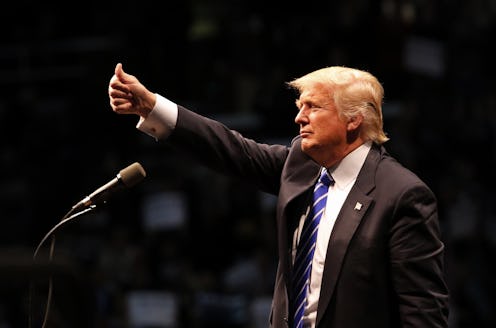News
Rule 40(b) Could Guarantee Trump The Nomination
The Republican Party has a self-imposed rule that could, in theory, require the party to nominate Donald Trump for president. It's Rule 40(b), which says that only candidates who've won a majority of delegates in at least eight states are even eligible to be nominated. The possibility of the GOP boxing itself into nominating Trump has many people wondering: When was the last time Rule 40(b) was used at a nominating convention?
The answer is never! At least, not in it its current form. A less stringent version of 40(b) was on the books at the 2012 convention, but it didn't have any practical effect on the proceedings or the nomination. Before 2012, Rule 40(b) didn't even exist.
The original version of the rule stated that candidates only needed to win a plurality (as opposed to a majority) of delegates in at least five states (as opposed to eight) in order to be eligible for nomination. At the 2012 convention, this requirement was in effect, but functionally irrelevant: Mitt Romney entered the convention with such a clear majority of delegates that there was no question that he'd become the nominee. The eligibility of other candidates was thus a moot point.
But parties do more at a convention than simply nominate a presidential candidate. They also approve temporary rules for the next nominating convention, and this is where Rule 40(b) comes into play. In 2012, the RNC Rules Committee made the requirements of 40(b) stricter, so that candidates needed a majority of delegates in eight states to be considered for the nomination.
Why the change? Amusingly enough, it was a preemptive attempt to protect Mitt Romney from a primary challenge in the event that he won the presidency in 2012. By making it harder for candidates to get on the nominating ballot, the RNC Rules Committee was ensuring that a President Romney, if challenged from the far-right in 2012, would still be nominated for reelection without difficulty.
But of course, Romney didn't become president in 2012, and because the 2016 field ended up being both gargantuan and highly fractured, Rule 40(b) is now working against Republicans. So far, the only candidate who has a majority of delegates in at least eight states is Mr. Donald Trump, and that would imply that, no matter what happens, he's going to win the nomination. Right?
Wrong. Ted Cruz and John Kasich shouldn't pack it up and go home yet, because, the GOP has the option of changing or eliminating Rule 40(b) before the nomination process starts. The Republican Party does, after all, get to set its own rules, and if this year's Republican delegates want to get rid of this requirement, they can. All they'll have to do is vote to get rid of Rule 40(b) before the convention, and according to Ben Ginsburg, the RNC member who wrote the rule, that's likely to happen.
Rule 40(b) probably won't rig the nomination for Trump. Its mere existence, though, shows how difficult it is for a party to set its nominating rules four years ahead of the next election. In 2012, no one could have predicted that the 2016 nomination would involve Donald Trump dominating a field of 17 candidates, but that's exactly what happened. Now, in all likelihood, the RNC Rules Committee will be headed back to the drawing board.
